|
|
|
Sort Order |
|
|
|
Items / Page
|
|
|
|
|
|
|
| Srl | Item |
| 1 |
ID:
160359
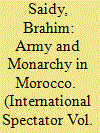

|
|
|
|
|
| Summary/Abstract |
The study of the complex relationship between army and monarchy in Morocco provides support for the argument that coup-proofing and institutionalisation enable civil leadership to enhance and maintain civilian control over the military. Through a strategy of coup-proofing implemented by the monarchy to protect itself from coups d’état, the army had been depoliticised. Through institutionalisation the Moroccan army is now governed by a clear set of constitutional and legal norms, principles and procedures with a system based on meritocracy. This approach is helping to stabilise relations between state and society and avoid power struggles between civilian leaders and the armed forces.
|
|
|
|
|
|
|
|
|
|
|
|
|
|
|
|
| 2 |
ID:
075790
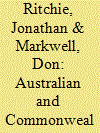

|
|
|
|
|
| Publication |
2006.
|
| Summary/Abstract |
When republics, beginning with India in 1949, were first admitted to the Commonwealth of Nations, Australia remained strongly attached to the Crown and the King's (later the Queen's) role as Head of the Commonwealth. Indeed, many Australians had seen a shared Crown as axiomatic, and a symbol of Commonwealth unity. Despite bursts of republicanism in Australia during the 19th and 20th centuries, it was not until the 1990s that a republic appeared likely. One historic driver of anti-British Australian republicanism has been the Irish heritage of many Australians. As republicanism grew, it was important that Australia could remain in the Commonwealth as a republic. The past decade has seen a stronger sentiment in Australia than in the other 'old Dominions' - New Zealand and Canada - that national independence and identity require the symbol of a home-grown head of state, rather than one seen as British. The growth of republicanism in such countries, and in Britain itself, would be likely to encourage republicanism in Australia. Australia's republican majority has been frustrated by its inability to agree on a model for parliamentary selection or direct election of the president. No Commonwealth country provides a model which Australians find compelling.
|
|
|
|
|
|
|
|
|
|
|
|
|
|
|
|
| 3 |
ID:
188647


|
|
|
|
|
| Summary/Abstract |
Even before the Arab Uprising waves, the grievances of increased demands on services and subsidies, shifting economic policy, the deteriorating core-periphery relations between Amman and erstwhile major centers in the Jordanian hinterland (e.g., al-Karak, Maʿān, al-Ṭafilah) have all characterized one aspect of the delicate balance of power in the Hashemite Kingdom. This article will examine the nature of this deterioration, and how the monarchy has variously conceded to, repressed, and thereby withstood repeated protests emanating from the hinterlands. Finally, this article examines a case study of the city of Maʿān as a bellwether hub of popular protest in Jordan.
|
|
|
|
|
|
|
|
|
|
|
|
|
|
|
|
| 4 |
ID:
121940
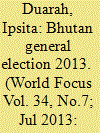

|
|
|
|
|
| Publication |
2013.
|
| Summary/Abstract |
The 2013 general election to the National Assembly and National Council of Bhutan laid another milestone of development of democracy in the Himalayan State. Bhutan became democracy in 2008 when it hold the first ever elections to the National Assembly and National Council. The hundred years old absolute monarchy transforms itself into a constitutional democracy without any internal or external demand. After centuries of Shabdrung rule (1616-1907), Bhutan became a hereditary monarchy in 1907.
|
|
|
|
|
|
|
|
|
|
|
|
|
|
|
|
| 5 |
ID:
152243
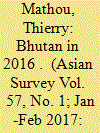

|
|
|
|
|
| Summary/Abstract |
Celebrated nationwide as a symbol of change in continuity, the birth of the future king gave confidence to Bhutan, which continued its path toward democracy and sustainable development without undermining its identity despite several challenges lying ahead.
|
|
|
|
|
|
|
|
|
|
|
|
|
|
|
|
| 6 |
ID:
160403
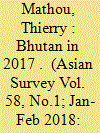

|
|
|
|
|
| Summary/Abstract |
Bhutan’s agenda in 2017 was dominated by the preparation for the third parliamentary elections (slated for 2018), the 12th Five-Year Development Plan (2018–23), and the golden jubilee of the establishment of diplomatic relations with India. A military standoff between China and India on Bhutan’s border highlighted the kingdom’s strategic regional position.
|
|
|
|
|
|
|
|
|
|
|
|
|
|
|
|
| 7 |
ID:
108897
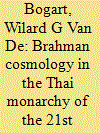

|
|
|
| 8 |
ID:
089350
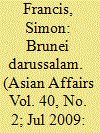

|
|
|
|
|
| Publication |
2009.
|
| Summary/Abstract |
A critical assessment of the history of Brunei over the last fifty years, with particular emphasis on the evolution of the economy and the way in which the constitutional process has been managed. The author discusses a number of areas of possible concern for the future, including the position of non-citizens and the difficulties of diversifying an economy almost entirely based on oil and gas.
|
|
|
|
|
|
|
|
|
|
|
|
|
|
|
|
| 9 |
ID:
130188
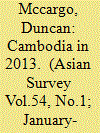

|
|
|
|
|
| Publication |
2014.
|
| Summary/Abstract |
Cambodia in 2013 was dominated by close-fought national elections on July 28, only narrowly won by the ruling Cambodian People's Party after an unexpectedly strong showing by the opposition. Generational change was a major theme of the year, seen in the growing activism of youth and the deaths of several prominent figures.
|
|
|
|
|
|
|
|
|
|
|
|
|
|
|
|
| 10 |
ID:
076274


|
|
|
|
|
| Publication |
2006.
|
| Summary/Abstract |
This article examines the political dimension of historiography in contributing to the Lao nation-state building project, with particular reference to institutional and social forms of Lao political culture, the role of minority groups during the Revolution and the lingering shadow of the country's aristocratic past. Reference is made to several key issues in current Lao historiography. The article also raises the issue of the respective political responsibilities of Lao and foreign historians in helping to construct a national history.
|
|
|
|
|
|
|
|
|
|
|
|
|
|
|
|
| 11 |
ID:
116379


|
|
|
|
|
| Publication |
2012.
|
| Summary/Abstract |
Thailand's monastic politics are in turmoil. No longer can the sangha be written off as a political force and viewed simply as a fount of legitimacy for the nation and the monarchy. The role played by a few hundred pro-Thaksin "redshirt" monks in the March to May 2010 mass demonstrations testified to growing unease within the rank-and-file monkhood, which is drawn from the same regions and segments of society as the redshirt movement more generally. But beyond these overt displays of dissatisfaction, the sangha faces a range of serious challenges. While long-standing tensions between the rival Thammayut and Mahanikai orders have apparently declined, a dearth of moral and administrative leadership has paralyzed the Thai monkhood and rendered it seemingly incapable of reforming itself. Competing power groups linked to secular politics are vying for influence within the Supreme Sangha Council, while there is no widely supported successor ready to replace the current supreme patriarch, himself nearly a hundred years old. In many respects, the political paralysis of the monkhood mirrors the wider crisis confronting the body politic of the Thai nation itself.
|
|
|
|
|
|
|
|
|
|
|
|
|
|
|
|
| 12 |
ID:
058102
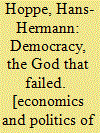

|
|
|
|
|
| Publication |
New Brunswick, Transaction, 2004.
|
| Description |
xxiv, 304p.
|
| Standard Number |
0765808684
|
|
|
|
|
|
|
|
|
|
|
|
Copies: C:1/I:0,R:0,Q:0
Circulation
| Accession# | Call# | Current Location | Status | Policy | Location |
| 048993 | 321.8/HOP 048993 | Main | On Shelf | General | |
|
|
|
|
| 13 |
ID:
118550
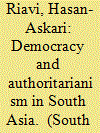

|
|
|
| 14 |
ID:
046730
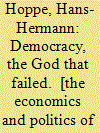

|
|
|
|
|
| Publication |
New Brunswick, Transaction Publishers, 2002.
|
| Description |
xxiv, 304p.
|
| Standard Number |
0765808684
|
|
|
|
|
|
|
|
|
|
|
|
Copies: C:1/I:0,R:0,Q:0
Circulation
| Accession# | Call# | Current Location | Status | Policy | Location |
| 045621 | 321.8/HOP 045621 | Main | On Shelf | General | |
|
|
|
|
| 15 |
ID:
178394
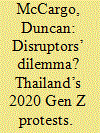

|
|
|
|
|
| Summary/Abstract |
This article offers a preliminary analysis of the hundreds of youth-inspired mass protests staged in Thailand during 2020. It argues that while calling for reforms and flirting with revolutionary rhetoric, the protestors lacked a clear programmatic agenda and were primarily engaged in disrupting dominant narratives about the country’s politics, especially in relation to the previously taboo question of the political role of the monarchy. Despite the ad hoc and sometimes incoherent nature of the protests, the students mounted a dramatic challenge to Thailand’s ruling elite. Ultimately, the conflict exemplified a generational divide: people from Generation Z, aged under 25, have radically different understandings of power, deference and legitimacy from older population groups. Whatever happens to the protest movement in the short term, the demonstrators have made a decisive break with the old social consensus that existed during the long reign of the late King Bhumibol (1946–2016).
|
|
|
|
|
|
|
|
|
|
|
|
|
|
|
|
| 16 |
ID:
151805
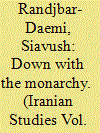

|
|
|
|
|
| Summary/Abstract |
The purpose of this article is to explore and analyze Iran’s “Republican Moment” of 16‒19 August 1953, arguably the last concerted effort to abolish the monarchy and establish a republican order in the county prior to the Revolution of 1978‒79. By drawing on a broad range of primary source materials that have thus far remained relatively understudied by existing scholarship, such as the political press of those crucial days, the essay will attempt to shed light on a number of significant domestic developments which impacted the outcome of the actual coup of 19 August 1953. A further attempt will be made to explain the importance of calls in favor of the Republic and the premier Mohammad Mosaddeq’s refusal to take heed of them. The paper will also explore the diverse origins of the Republican platform and its impact on both the urban crowd and the political elite.
|
|
|
|
|
|
|
|
|
|
|
|
|
|
|
|
| 17 |
ID:
183687
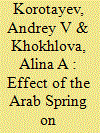

|
|
|
|
|
| Summary/Abstract |
In the Middle East and North Africa (MENA) region after the Arab Spring, monarchy has turned out to be a far stronger negative predictor of destabilization than it was before 2011. For the MENA, the period after 2010 can be subdivided into three periods: a mass protests period (2011–2012), the period of explosive growth of radical Islamist activities (2013–2016), and the second mass protest period (since 2016). Our analysis demonstrates that monarchies’ stabilization capacity was preserved in 2011–2012 and grew substantially during 2013–2016, as MENA monarchies turned out to be more resilient in the face of the outbreak of radical Islamism in the region.
|
|
|
|
|
|
|
|
|
|
|
|
|
|
|
|
| 18 |
ID:
124462


|
|
|
|
|
| Publication |
2013.
|
| Summary/Abstract |
The 1960s in Afghanistan's history were marked by the emergence of a number of political parties, from monarchist to radical left and right. They played an important role in the social, cultural and political dynamics of the time and even the future of the country. This paper explores how political parties emerged in a country which was characterized as a tribal-peasant society with only a very small number of educated people. It also discusses why the monarch would not sign the Political Parties' Bill and how this influenced Afghanistan's political culture and led to the radicalization of the political parties. In addition, it examines how the anti-government and radical political parties managed to mobilize people and dominate the political scene while the pro-government and nationalist parties had little influence.
|
|
|
|
|
|
|
|
|
|
|
|
|
|
|
|
| 19 |
ID:
176085


|
|
|
|
|
| Summary/Abstract |
How is it possible to account for the continuing presence of monarchy in advanced social democracies? Much traditional political science assumes teleologically that monarchies inevitably transform into republics as a higher form of governance. This comparative study of the eight main European monarchies maintains otherwise: monarchy is perfectly compatible with democracy, and can help strengthen citizens’ loyalty to the system of government. Provided it delivers a politically impartial head of state, monarchy can endure indefinitely with government and popular support. In practice, the countries studied are de facto republics, but with hereditary heads of state who occupy social roles beyond the reach of quotidian politics. Monarchy’s principal danger is not republicanism, but the pressures of conflicting expectations about what is required of royal families, and the relentless intrusions of modern media in an age when royalty and celebrity are in danger of being conflated. Responses to Covid‐19 show how monarchs can speak to and for their nations in ways no partisan politician can.
|
|
|
|
|
|
|
|
|
|
|
|
|
|
|
|
| 20 |
ID:
098327
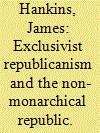

|
|
|
|
|
| Publication |
2010.
|
| Summary/Abstract |
The idea that a republic is the only legitimate form of government and that non-elective monarchy and hereditary political privileges are by definition illegitimate is an artifact of late eighteenth century republicanism, though it has roots in the "godly republics" of the seventeenth century. It presupposes understanding a republic (respublica) to be a non-monarchical form of government. The latter definition is a discursive practice that goes back only to the fifteenth century and is not found in Roman or medieval sources. This article explains how the definition emerged in Renaissance Italy.
|
|
|
|
|
|
|
|
|
|
|
|
|
|
|
|
|
|
|
|
|